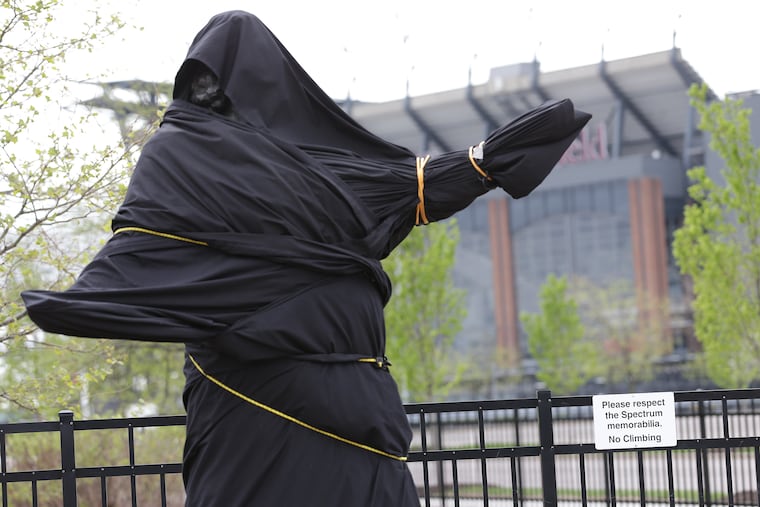What’s the story behind those Kate Smith songs with racist lyrics?
New attention is being paid to songs with racist lyrics that Smith sang in the 1930s.

Until last week, Kate Smith was an unlikely but miraculously enduring sports and music institution.
Decades after the peak of popularity for “The Songbird of the South” had passed, her version of “God Bless America” lived on.
The Irving Berlin composition was frequently played instead of “The Star-Spangled Banner” at Flyers games at the Wells Fargo Center, as well as during the seventh inning stretch at New York Yankees games.
Smith, as the Flyers’ pre-Gritty good-luck charm, had occasionally sung the song in person at the Spectrum, the Flyers’ former home, including during their 1970s Stanley Cup winning seasons. Her status was such that the statue erected a year after her death stood outside that building along with ones of Philly legends Sylvester Stallone and Julius Erving.
But suddenly, Smith is persona non grata in Philadelphia and elsewhere (the Yankees dropped her last week). On Friday, the Flyers covered up her statue — which had been outside the Xfinity Live! entertainment complex since the Spectrum was demolished in 2009. And overnight on Sunday, the statue was removed, with the Flyers making a clean break with the singer to whom they’d been so closely tied.
Why? Because new attention is being paid to songs with racist lyrics that Smith sang in the 1930s.
“The NHL principle ‘Hockey for Everyone’ is at the heart of everything the Flyers stand for,” team president Paul Holmgren said in a statement Monday. “We cannot stand idle while material from another era gets in the way of who we are today.”
The material that Holmgren referred to is two songs that the powerful-voiced Smith recorded in the 1930s, when she was under contract to Columbia Records.
The first is “That’s Why Darkies Were Born,” a song written by Ray Henderson and Lew Brown that was a hit for the Virginia-born Smith in 1931. The lyrics appear to be as white supremacist as it gets: “Someone had to pick the cotton, someone had to pick the corn, someone had to slave and be able to sing / That’s why darkies were born.”
The history of the song is a bit more nuanced. Paul Robeson, the African American bass baritone, actor, and activist who was blacklisted in the 1950s and died in Philadelphia in 1976, also recorded it, providing fuel to those who would argue that perhaps it was meant as a satirical critique of racist attitudes.
But if Smith was intending a subtly subversive critique of Depression-era racism, it can’t be detected from her performance, which has survived on a crackling old 78 rpm record.
The second song that presumably caused the Flyers to disavow Smith is more unequivocal in its presentation. It’s called “Pickaninny Heaven,” and Smith performed it in a 1933 movie, Hello Everybody.
The clip — the one I watched was recently taken off YouTube — shows Smith dedicating the song to “a lot of a little colored chillen listening in, in an orphanage in New York City,” then singing about “the place where the good little Pickanninies go” where “great big watermelons roll around, getting in your way.”
As the website of the Jim Crow Museum of Racist Memorabilia points out, pickaninny or picaninny refers to caricatures with “bulging eyes, unkempt hair, red lips, and wide mouths into which they stuffed huge slices of watermelon. They were themselves tasty morsels for alligators."
Do Smith’s recordings of these two songs — out of 3,000 she recorded, according to her family, which is reportedly “appalled” by the singer’s being vilified when she “was anything but a prejudiced person” — prove that Smith was a racist?
She’s not here to answer for herself. She did not write the songs, and it’s not likely that she selected them, either. That was more likely a decision by someone like Ted Collins, the artist and repertoire executive at Columbia who spotted her singing in George White’s musical Flying High in 1929 and advised her to put “God Bless America” in her show in 1931.
But “Darkies” and “Pickaninny” aren’t the only examples of Smith being associated with regressive racial attitudes that are now viewed as grossly offensive, even if they were acceptable to a white audience at the time. In 1939, an advertisement for a Smith cookbook used a “Mammy Doll” caricature, depicting black women as eager-to-please servants.
Is this controversy the latest example of overreaching political correctness run amok? Or do the attitudes expressed in the songs demonstrate hateful intolerance? The Flyers decided on the latter.
On Monday, the controversy spread to the New Jersey Shore. Wildwood Mayor Ernie Troiano said his town would continue to play Smith’s rendition of “God Bless America” every morning along the boardwalk throughout the summer.
“It’s an Irving Berlin patriotic song that has nothing to do with anything other than America,” Troiano told WPHT’s Dom Giordano on Monday. “I can assure you that my conversation with the mayor of North Wildwood, Patrick Rosenello, is, we have no intentions of removing it.”
“That’s not a statement that we don’t understand what’s going on, and we’re ignorant to the history and all that. … We understand the history,” Troiano added. “But the world’s gotten so politically correct and so afraid that they’re going to offend somebody. … The song is greater than anything. So you know what? It’ll continue to play in Wildwood.”
Staff writer Rob Tornoe contributed to this article.